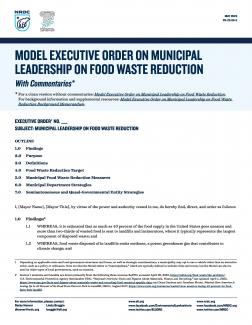Model Executive Order on Municipal Leadership on Food Waste Reduction: With and Without Commentaries

Given the large amount of food that some municipalities procure and the many people that they employ, the impact of food waste reduction measures in municipal operations can be substantial and far-reaching. For example, New York City purchases $500 million worth of food each year and employs around 325,000 people across dozens of agencies.
ELI Announces Partnership to Advance Government-to-Government Consultation in State and Local Decisionmaking
Environmental Law Institute to Recommend Best Practices for Sustainable Industrial Aquaculture
(Washington, D.C.): The Environmental Law Institute (ELI) is launching a new project in partnership with the Belfast, Maine-based Friends of Harriet L. Hartley Conservation Area (FHLH) to identify best practices for sustainable, environmentally responsible industrial aquaculture. Aquaculture is a rapidly growing industry, representing 46% of the global fish market in 2018, and experts project two-thirds of all fish will be farmed by 2030.
ELI Receives Robert Wood Johnson Foundation Grant to Advance Racial Equity and Justice for California Native American Tribes
(Washington, D.C.)—Tribal citizens’ physical, mental, and spiritual wellness is tied to environmental health, food sovereignty, and cultural identity. Yet, state and local environmental agencies regularly make decisions that impact the health and wellness of tribal communities without engaging in meaningful government-to-government consultation.
New Toolkit Helps Cities Address Climate Change & Food Waste Simultaneously
(Washington, D.C.): Throughout the United States, our towns and cities are on the front lines when it comes to addressing food waste and climate change. Recognizing the link between these two challenges, the Environmental Law Institute has released a new report that will help towns and cities address these challenges simultaneously—in their climate action plans.


